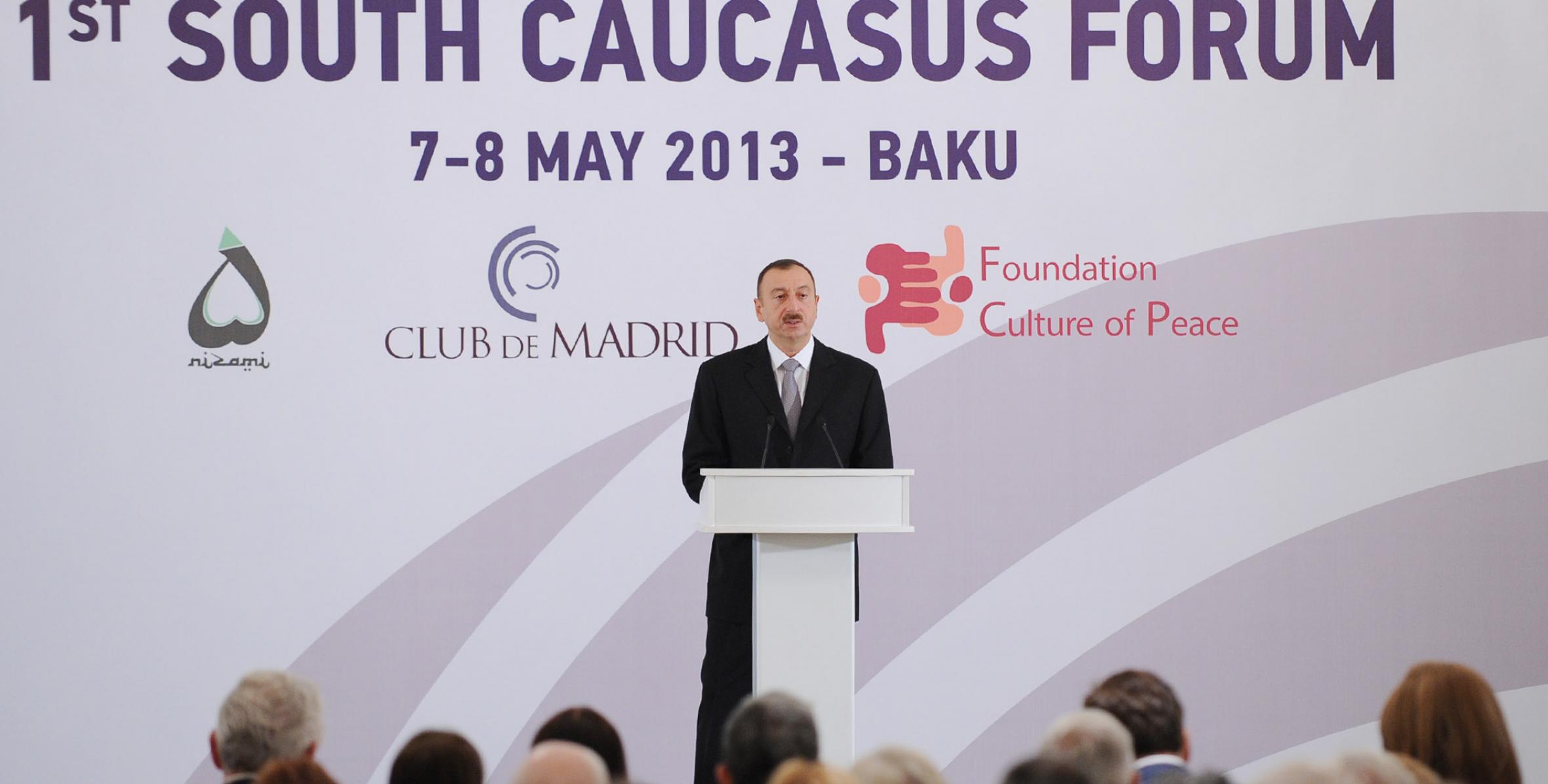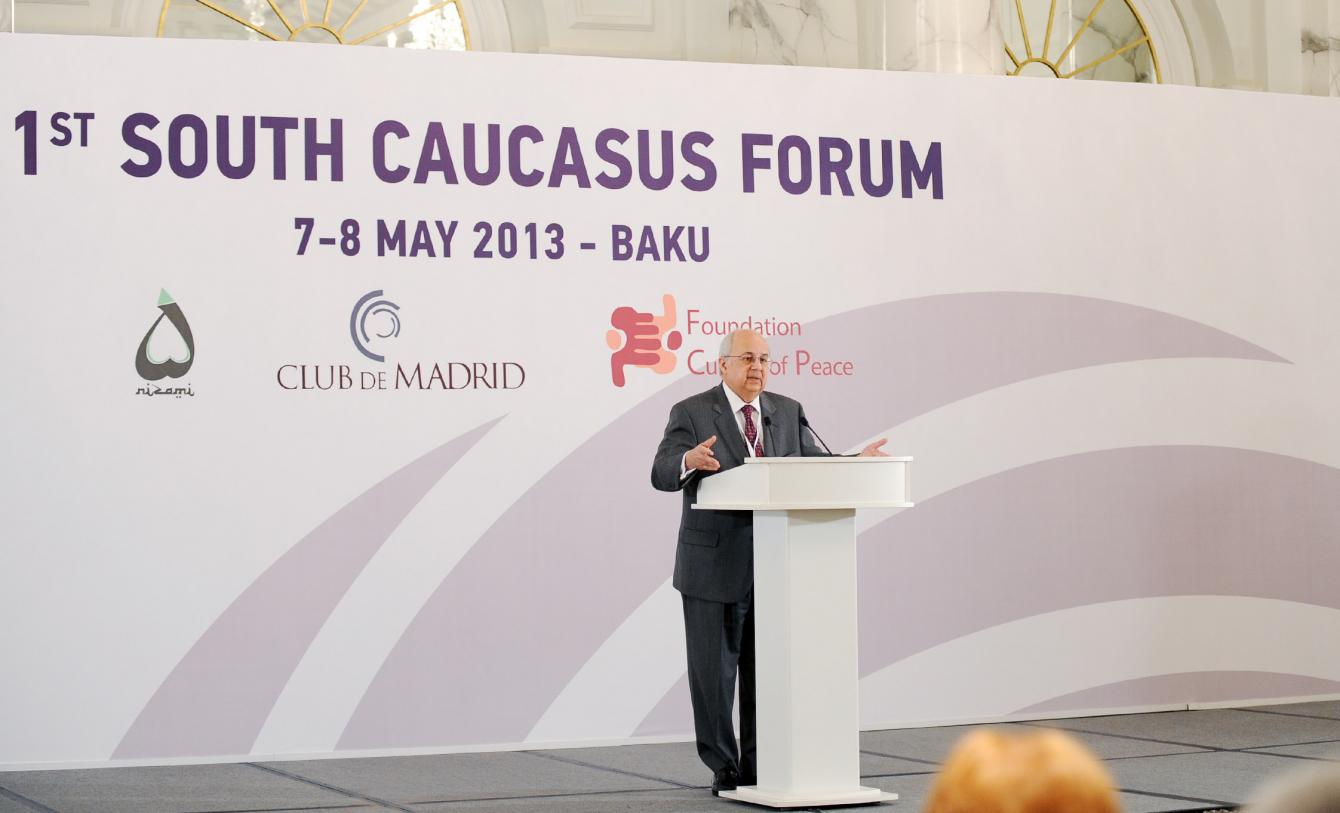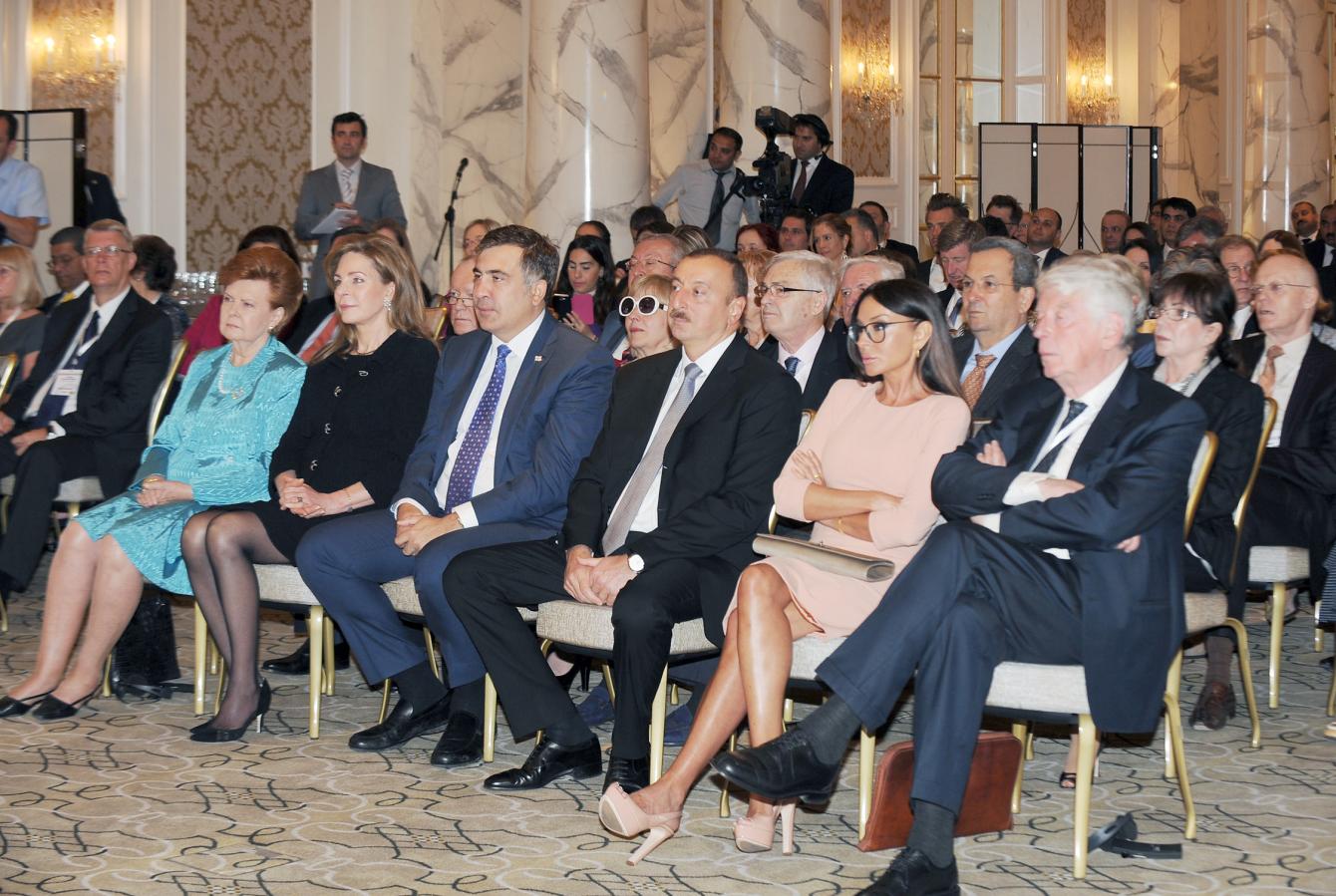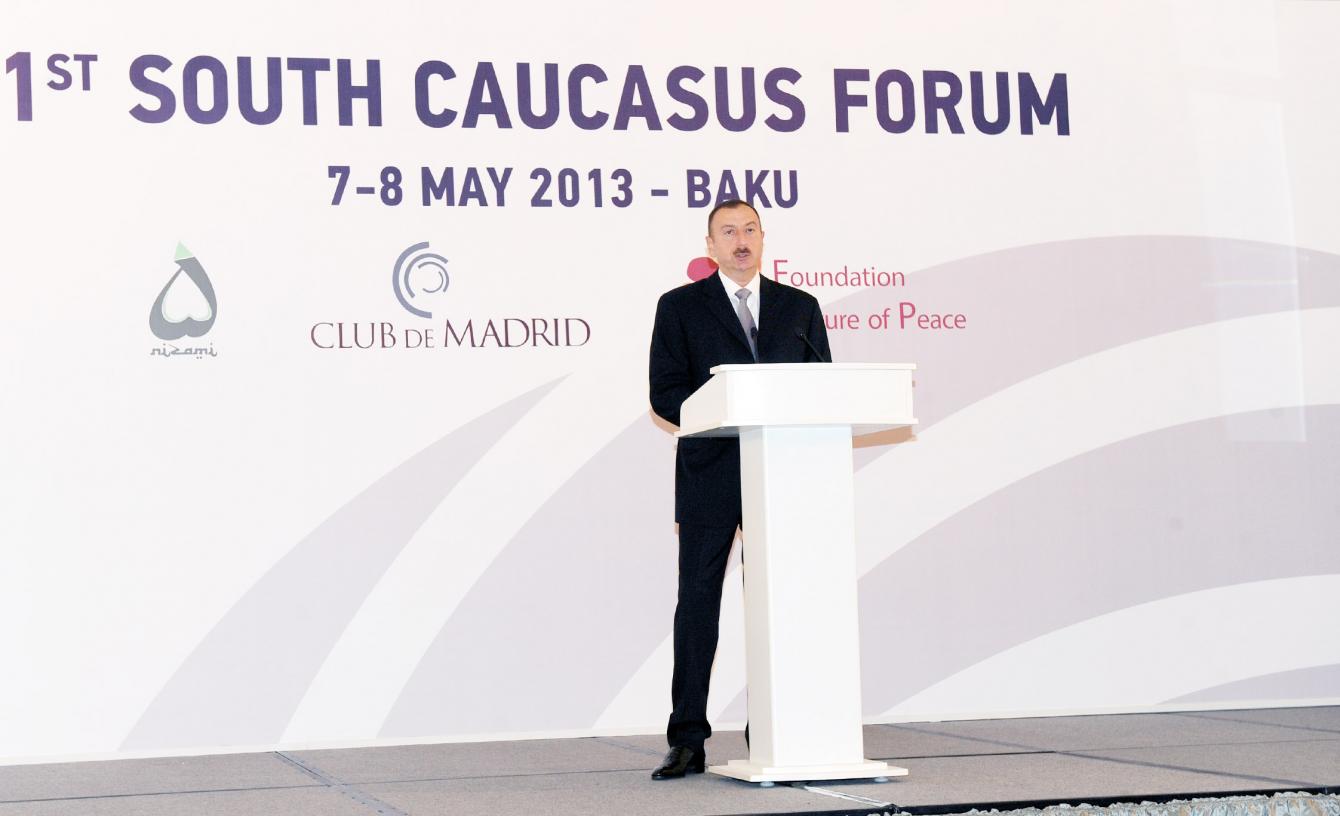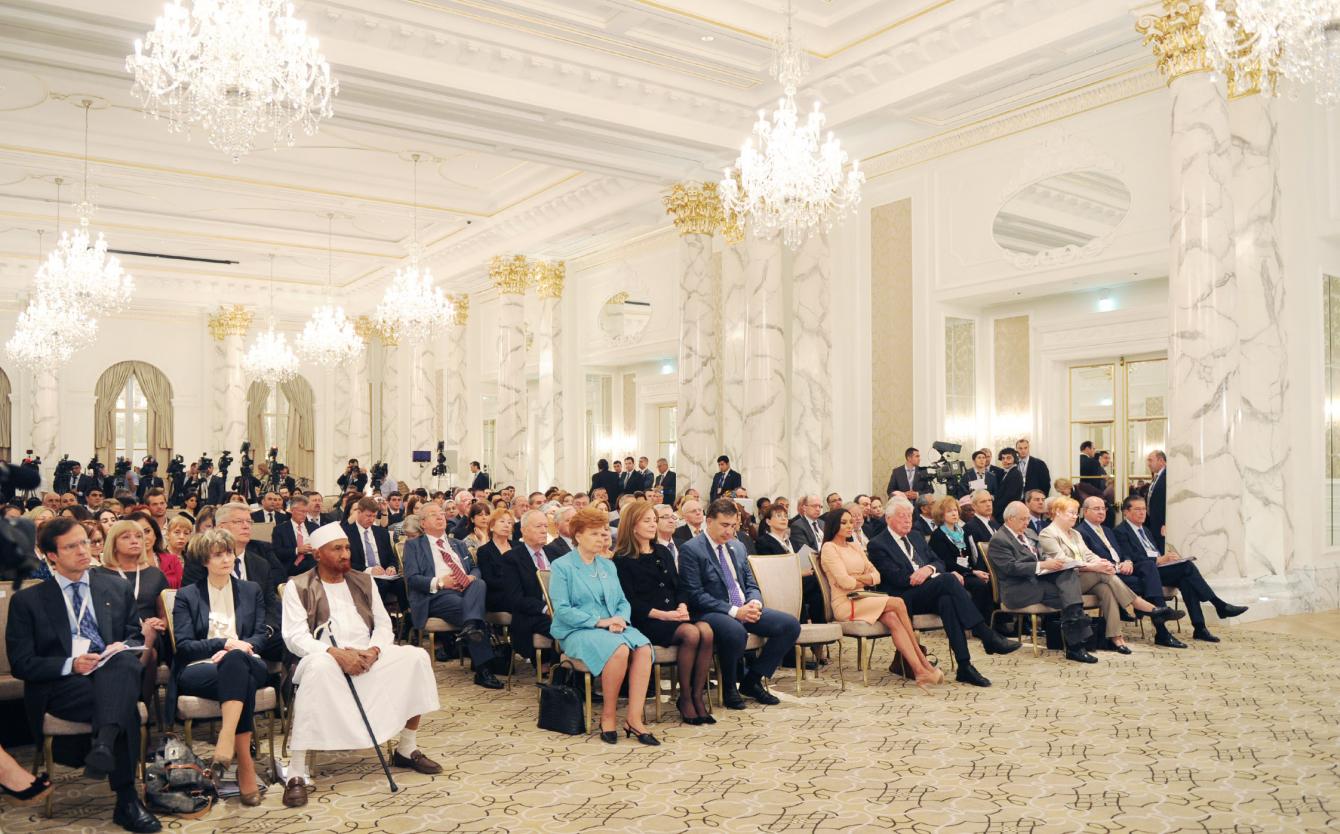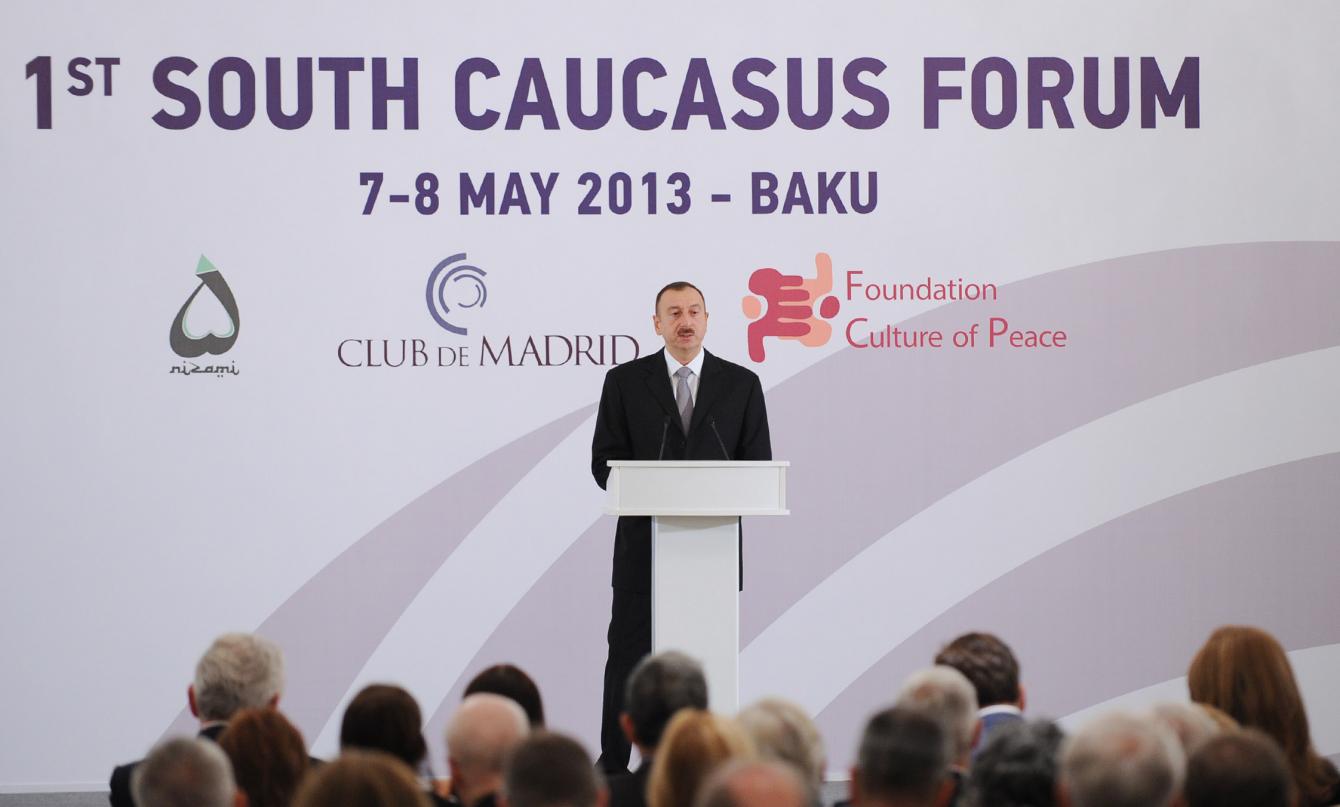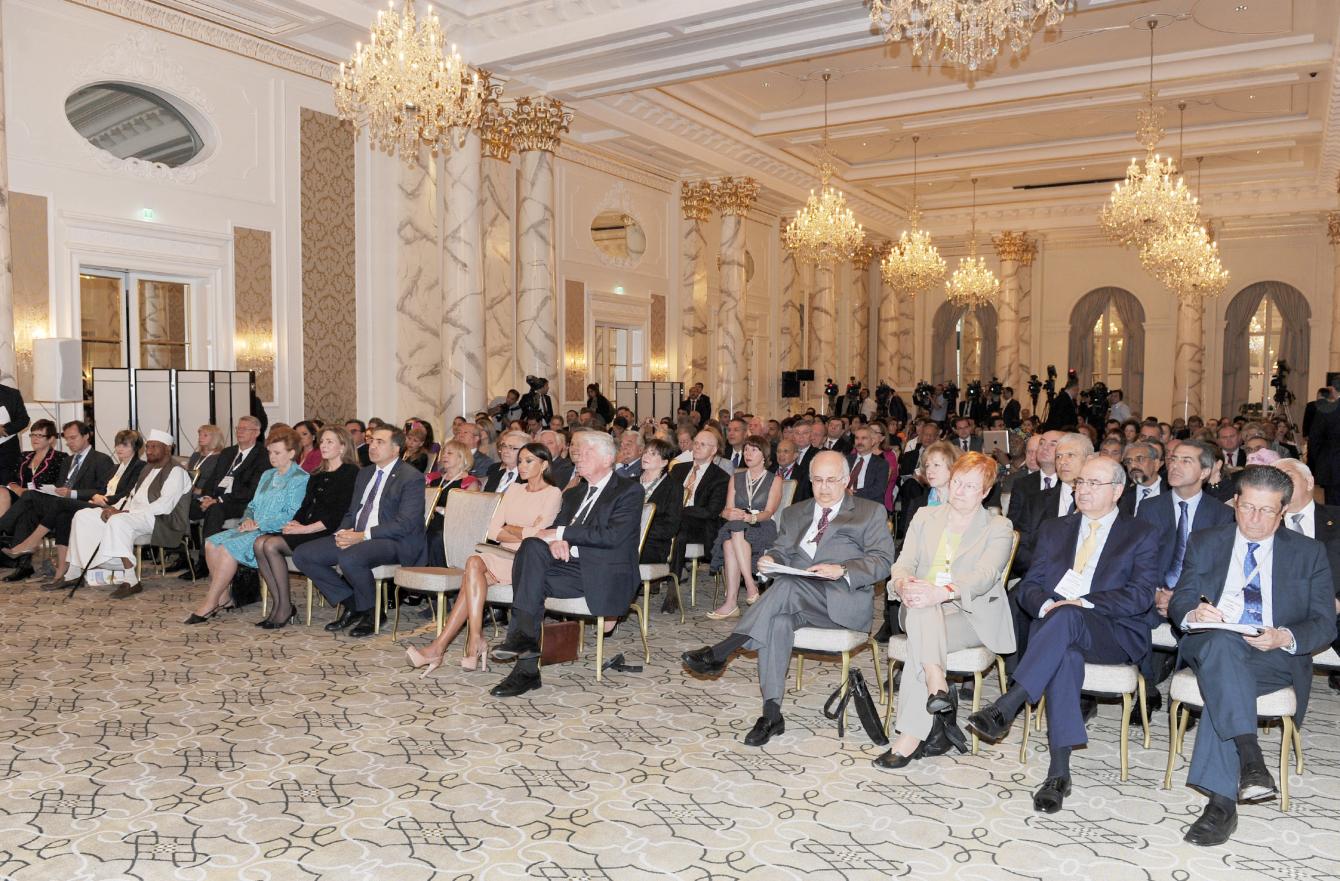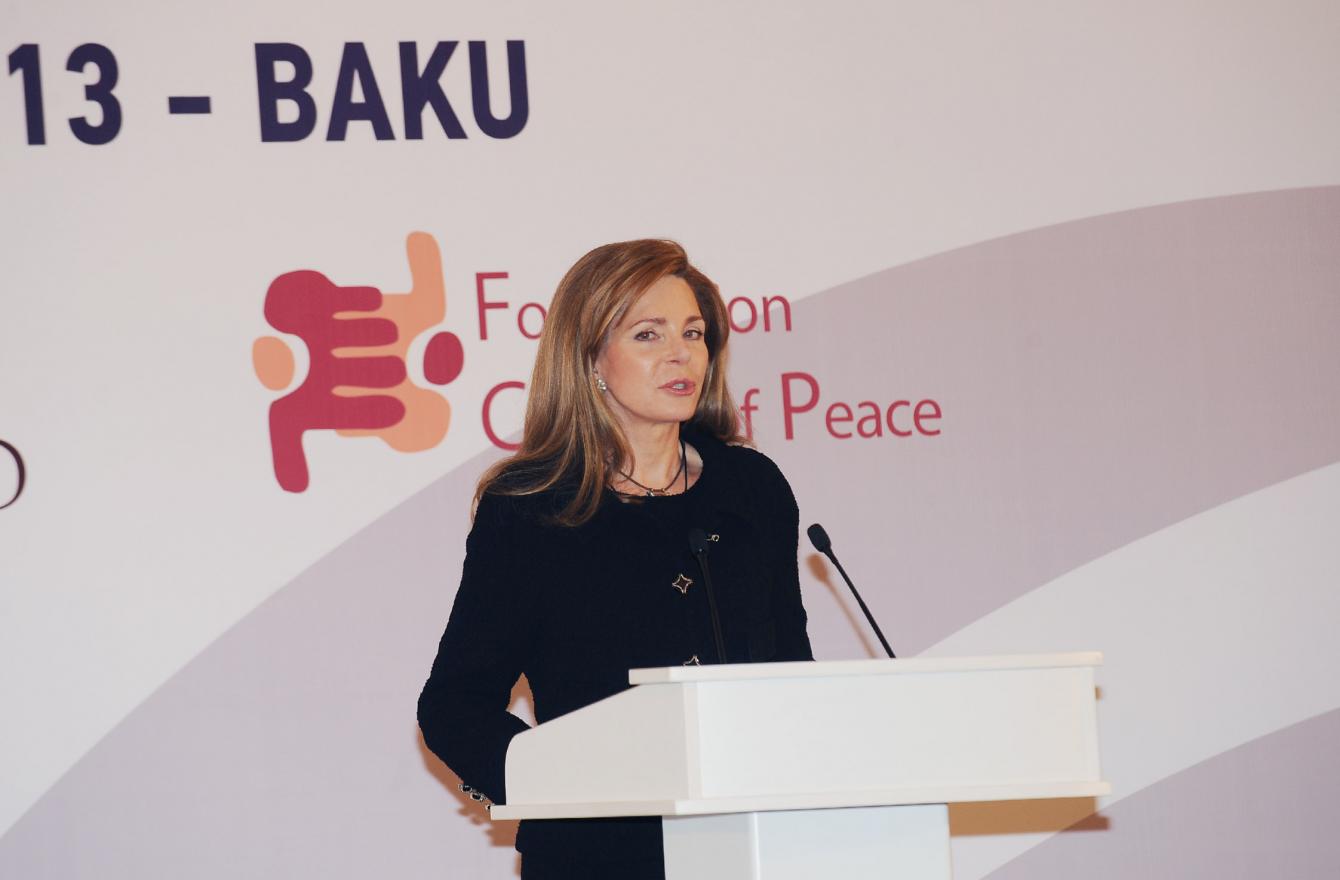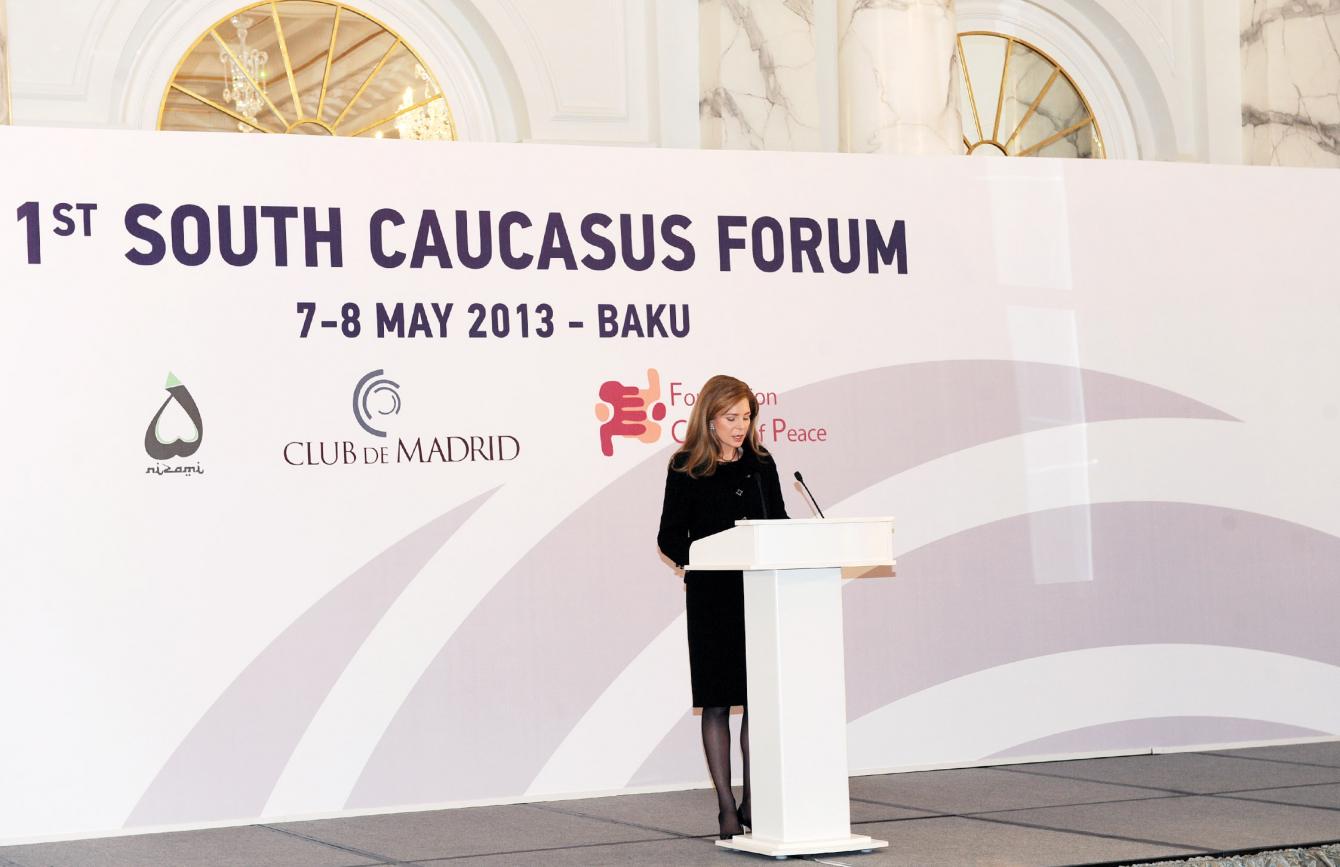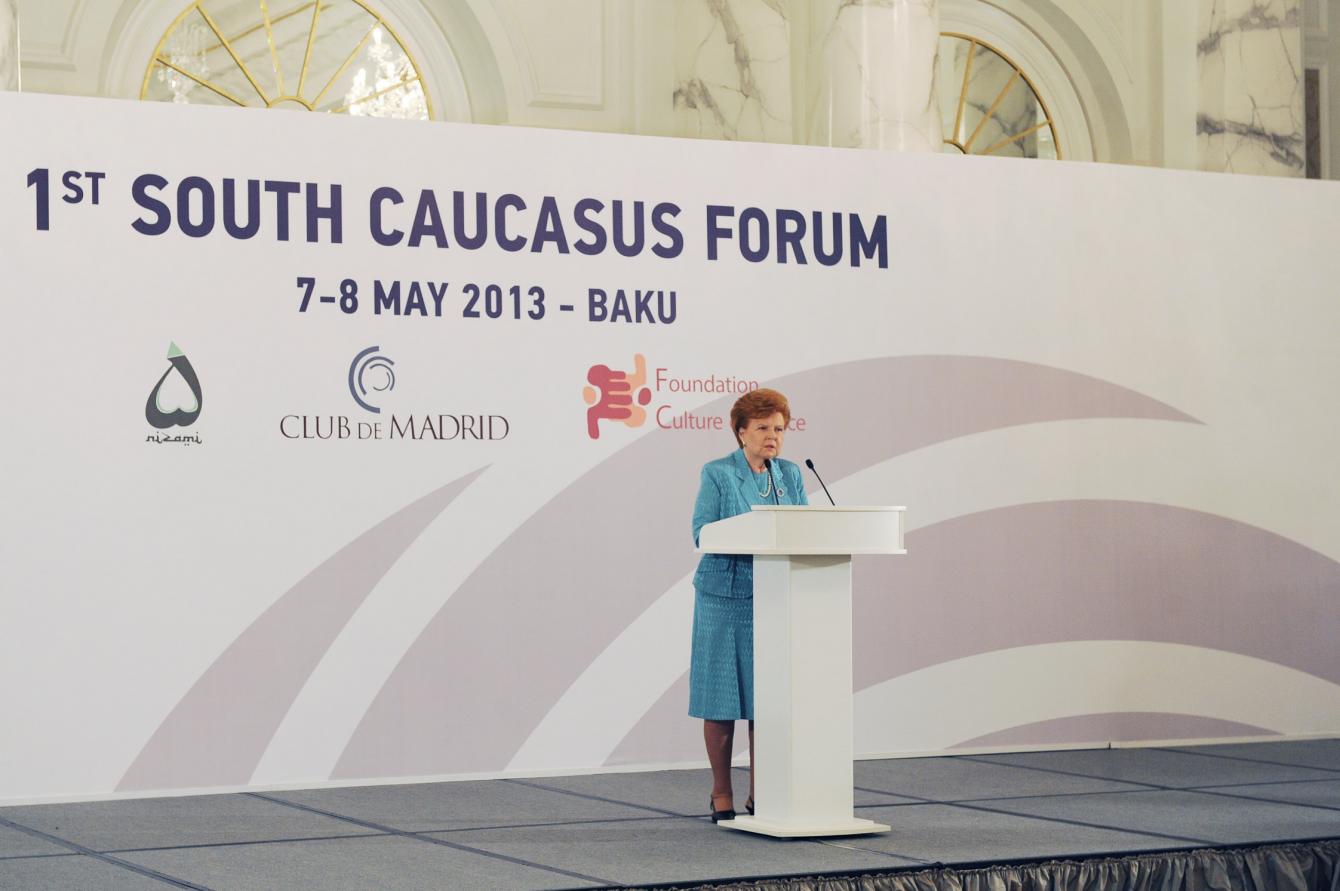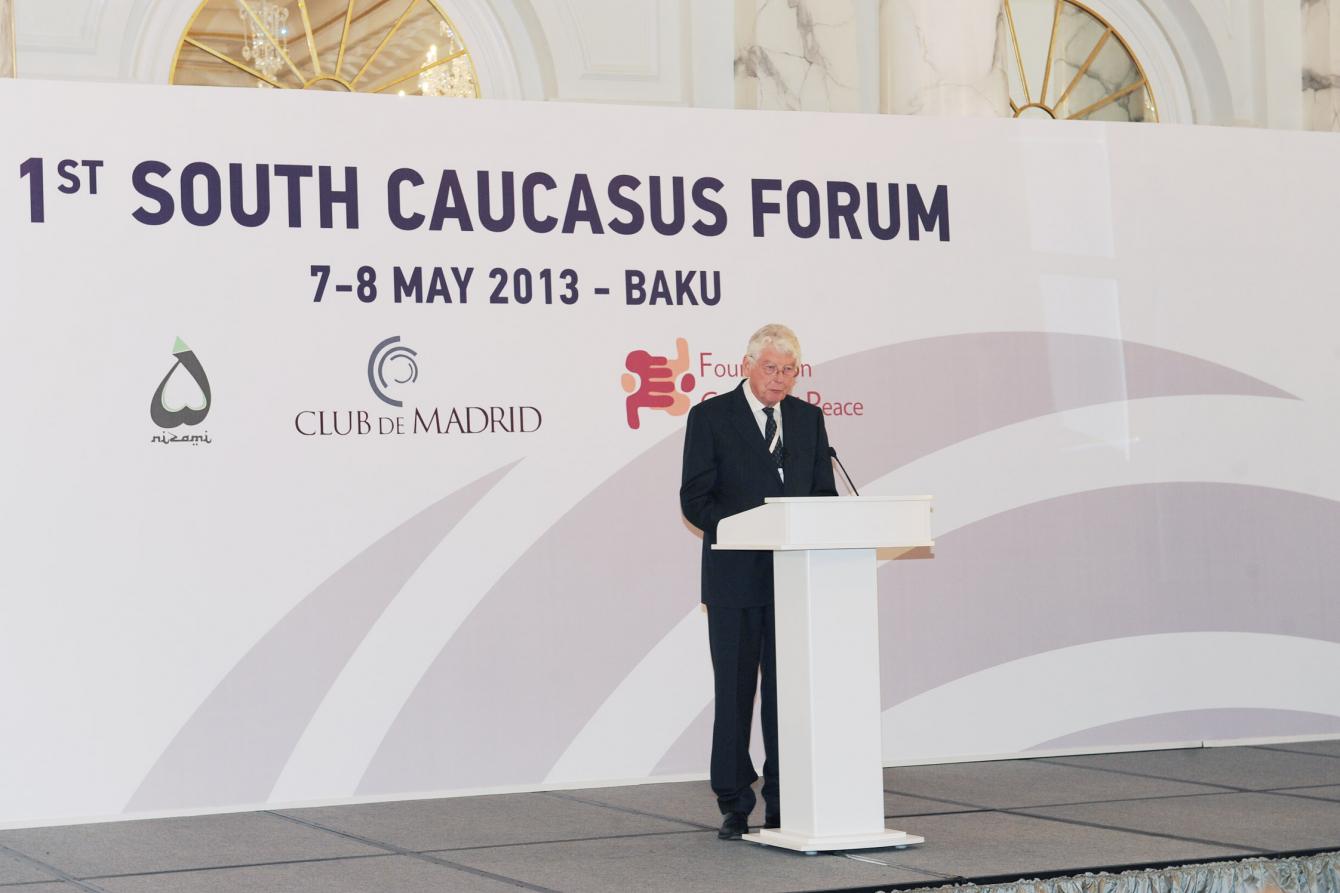The First South Caucasus Forum, organized jointly by the Club of Madrid and the International Center of Nizami Ganjavi, has started in Baku.
President Ilham Aliyev and his wife Mehriban Aliyeva have attended the opening ceremony.
The First South Caucasus Forum was opened by the Cochairman of the Board of the International Center of Nizami Ganjavi and the Director of the Library of Alexandria of Egypt, Ismail Serageldin. Informing the participants about the issues to be discussed, he said.
- We are gathered here with one aim today - to participate in the First South Caucasus Forum on the subject of "Joint societies".
I want to indicate that the forum will discuss issues such as a clash of civilizations, shared values and norms that govern our societies. In fact, questions may be asked on any topic. People discuss issues relating to cultural differences between them, gender equality, formation of a sustainable society in the future, etc.
The forum is attended by leaders, presidents, prime ministers from practically all over the world. These people lived and led their countries in a period of transition, and have come to this forum to share their experience with us. Of course, they will express their opinion within the framework of the forum.
The host of the forum is His Excellency President of the Republic of Azerbaijan, Dr. Ilham Aliyev. We give him the floor.
ХХХ
President of the Republic of Azerbaijan Ilham Aliyev addressed the forum.
Speech by President of the Republic of Azerbaijan Ilham Aliyev
- Dear ladies and gentlemen!
Distinguished guests!
I would like to welcome all of you to our country. It is a great honor for us to host such an important event. I am very grateful to the organizers for choosing Baku as a venue for the discussion of issues of regional development, reforms and regional cooperation.
From the point of view of independence, Azerbaijan is a relatively young country. Our country is only 21 years old as an independent state. Azerbaijan is a country with a long history, customs, traditions and culture.
One of the organizers of the forum is the International Center of Nizami Ganjavi. It bears the name of brilliant Azerbaijani poet Nizami. Yesterday I had meetings with a number of guests. Some of them have come to our country for the first time. I think it would be interesting for them to get acquainted with our country. There are some of our old friends among the participants. I want to express my deep gratitude to the Club of Madrid for conducting this forum in Baku.
Azerbaijan is a young independent nation. But at the dawn of the 20thcentury, we had a short history of statehood. At that time Azerbaijan gained independence after the fall of the Russian Empire. It was in Azerbaijan that the first democratic republic in the Muslim world was established. The first democratic republic existed from 1918 to 1920. Although it was a short period, many reforms were implemented. They set the stage for the development of the modern and independent Azerbaijan. One of those reforms was the provision of women with the right to elect and to be elected. It also demonstrated the level of development of Azerbaijani society. Then the Soviet period set in. At that time we were not independent. The people of Azerbaijan lived in the Soviet Union for 70 years. After the collapse of the Soviet Union we got the second chance to create a state. And we had no right to waste that chance.
The first years of independence, 1991-1993, were accompanied by violence, economic stagnation, crisis, Armenia’s military aggression against Azerbaijan, which has become a real tragedy for our people, and civil strife.
Despite the fact that we have overcome many of the difficulties of that period and the period of transition is over for our country, the unresolved status of the conflict between Armenia and Azerbaijan poses the biggest threat not only to us but also to regional development, peace and stability. We are interested in a speedy settlement of the conflict based on the norms and principles of international law. We want to restore the internationally recognized territorial integrity of our country. Nagorno-Karabakh is an integral part of Azerbaijan, it is ancient Azerbaijani land. Not only Nagorno-Karabakh but also seven adjacent districts have been under Armenian occupation for over 20 years. This occupation has lasted for more than two decades. International organizations have adopted resolutions and decisions demanding a withdrawal of the occupying forces. Among them, I want to mention four UN Security Council resolutions calling for an immediate and unconditional withdrawal of Armenian troops from Azerbaijani territories. Unfortunately, these resolutions are not being fulfilled. Here we come to an important point - the effectiveness of international organizations and resolutions.
Unfortunately, UN Security Council resolutions have remained unfulfilled for more than 20 years.
We will continue to strengthen our country, keep on implementing political and economic reforms. The stronger we are, the sooner we can resolve the conflict. Then peace may be established in the region. Speaking about the South Caucasus today, we can say that there is a fine example of cooperation between Georgia and Azerbaijan. But with the other country of the South Caucasus we have very negative relations. Therefore, in order to ensure sustainable development of the region, the South Caucasus, of course, needs to be more integrated. Without the settlement of the Nagorno-Karabakh conflict and the liberation of the internationally recognized territory of Azerbaijan this is impossible.
Despite this difficulty and the damage caused as a result of the Armenian aggression, we remain committed to goals such as the building of a strong country and improving the well-being of the people. In short, since the mid-1990s, we have been focused on political and economic reforms. This process is ongoing. From a political point of view, Azerbaijan is developing because we did not have any political system before the independence. Now we have all the political institutions and we are a member of the international community. We are carrying out political reforms and further democratization of our society is our main priority.
We are absolutely convinced that we must simultaneously carry out political and economic reforms. To be able to achieve long-term development, these reforms should complement each other. With regard to economic reforms, we have made great progress in the years of independence. In the last 10 years alone our gross domestic product grew by 300 per cent. I think this is a world record. At the same time, we have managed to reduce poverty from 50 to 6 per cent.
We have reduced unemployment to 5 per cent. More than a million jobs have been created in Azerbaijan. In addition, we are diversifying our economy. Azerbaijan's economic achievements have not gone out of the spotlight of the international financial institutions. The assessments of the major international financial institutions are very positive. Even in the years of the financial crisis the international rating agencies such as Fitch, Standard and Poor's and Moody's upgraded the credit rating of Azerbaijan. The Davos Economic Forum has put Azerbaijan in 46th place in the Global Competitiveness Index. This is the result of the reforms. We have managed to implement major economic reforms and, as I said, the period of transition in terms of economic development is over. Currently, the private sector accounts for 83 per cent of our economy. The private sector is very strong, and from an economic point of view the future development of Azerbaijan looks very attractive.
Currently, we are focusing our attention on the non-energy sector. As I said, economic diversification is our top priority. I can say with great satisfaction that the first three months of this year have registered unprecedented growth in the non-energy sector. This growth has exceeded 11 per cent. This means that the investment we have attracted from the outside and from domestic sources is aimed at diversifying the economy. Without diversification we can’t succeed. We are investing heavily in modern technology. An important event has occurred this year. Azerbaijan launched its first satellite Azerspace-1 into orbit. This marks the start of a space industry in Azerbaijan. Azerspace-1 means that there will Azerspace-2, Azerspace-3 and others. We are working with our international partners to create a strong aerospace industry in Azerbaijan. The energy sector is still an important sector of our economy. And it is natural. Over the years and decades, Azerbaijan was known as an oil country. Now Azerbaijan is also known as a gas producing country. The investment in the energy sector has enabled us to create a very positive investment landscape in Azerbaijan. Azerbaijan has the highest indicator in the region for the volume of foreign investments per capita.
The companies investing in Azerbaijan enjoy favorable treatment. In general, the investment environment is very positive.
I think that we have used the income from energy production correctly, so that not to experience the difficulties faced by some countries after the start of work in the energy sector. We set up such an important mechanism for managing funds as the State Oil Fund of Azerbaijan. This is one of the most transparent structures among similar sovereign funds around the world. Thus, we are insured against a situation whereby the rich become even richer and the poor get even poorer. Therefore, the reduction of poverty and unemployment was set as the primary goal.
Equitable distribution of wealth, investments in the infrastructure and human capital, mainly the field of education, are very important. Education is the key to success. The history and experience of successful countries show that development is caused not by energy resources but by the intellectual potential. In the coming years, the intellectual potential will play an increasingly important role in all political and economic development matters. The role of countries on the global map will depend more on the intellectual capacity of people. Therefore, we are investing a lot in human capital. Ten years ago we said that we would transform the "black gold" into "human gold", i.e. the human capital. The diversification of the economy, the implementation of social and infrastructure projects we have undertaken in Azerbaijan show that we have a good experience with regard to the transition period. So we have a good experience of transition from a totalitarian to a democratic society, from a planned economy of the state to a free market economy. This did not lead to difficulties for the ordinary people. After all, radical reforms always create problems for ordinary people. Therefore, we have implemented a very effective social policy.
Today, Azerbaijan is a country possessing great financial strength, diversified supply routes and a modern infrastructure, and relying completely on its own forces. The crisis has not had a big impact on us. Of course, the energy factor will play a role in helping us achieve greater development in the future. At the present time, I can say that Azerbaijan's energy resources play an important role in the regional cooperation. As a matter of fact, Azerbaijan was the first country in the world to produce oil. In addition, Azerbaijan was the first country in the world to produce oil offshore. Azerbaijan is also the first country to have attracted foreign companies and investment to the Caspian Sea, making it open to international petroleum operations. Azerbaijan built the first pipelines from the Caspian Sea together with its partners. Pipelines have been built to Georgia and Turkey. This has completely changed the energy map not only of the South Caucasus but also of the wider region. Today, in order to realize our vast energy potential which will last for more than 100 years, we are working hard with our friends and partners, in particular with European institutions, and, of course, with our neighbors, in the field of energy security. The recently launched Trans-Anatolian pipeline project means genuine reform in the energy sector. It will provide us with the opportunity to transport as much as we produce. Transit and consumer countries will be able to benefit from that and will have diversified sources of supply. Therefore, diversification in producing and consumer countries is one of the primary conditions for success.
We have created a very effective format for regional cooperation and seek to balance the interests of producer, transit and consumers countries. We seek to prevent irrelevant competition. Our energy policy is not based on competition, but on cooperation, on a situation that benefits everyone.
I believe that the history of the last decade demonstrates that this approach is very effective. Therefore, I think that the use of this potential, as well as our development programs and a very active foreign policy, will determine the successful development of Azerbaijan in the coming years.
Our guests today include well-known politicians and statesmen. They have played and will continue to play an important role in international relations. I would like to say a few words about that. We have a very active foreign policy. Azerbaijan's foreign policy is even more active than we expected. The results of this activity are explained by the fact that we play an important role in international organizations. We are one of a handful of countries of the world to be a member of both the Organization of Islamic Cooperation and the Council of Europe. Less than two years ago Azerbaijan was elected a member of the UN Security Council with the support of 155 countries. This was a very important event, which overlapped with the 20th anniversary of our independence. As a result of the work we have done in 20 years, we managed to get the support of 155 countries. And that epitomizes the role we play in the global arena. If we return to the issue of membership in international organizations, i.e. if we talk about our membership in the Council of Europe and the Organization of Islamic Cooperation, I would like to sum up my thoughts with the following idea. This is not due solely to the geographical format, but to our foreign political activity.
This is an issue which, among other things, boils down to the ancient history and the roots of our nation. For centuries, Azerbaijan was a place where religious and ethnic groups have coexisted in peace. Ethnic, cultural and religious diversity is one of the greatest treasures of Azerbaijan. I think that one of the basic preconditions of success is the fact that Azerbaijan has a multicultural society. We very much appreciate multiculturalism. This issue will probably be discussed during the session today. I just want to say on Azerbaijan's experience that multiculturalism has a great future and that it has no alternative. The alternative to multiculturalism is self-isolation, discrimination and racism. We can’t afford to let these negative trends to raise their head in the 21st century. There are some issues that worry and disappoint us. But we need to act very explicitly in these issues. We need to be very open and clear. The dialogue between civilizations should not be just a good slogan. It means the need for human development, greater international cooperation, broader mutual understanding and tolerance. I think this is one of the key conditions for the development of humanity in peace.
Dear friends, dear guests! I would like to thank all of you again for coming to Azerbaijan. I hope that for those of you who have come here for the first time it will be an opportunity to become better acquainted with our country, while long-time friends will be able to meet with each other and continue cooperation.
I wish the forum success. Thank you.
XXX
Queen Noor of Jordan expressed her great satisfaction with her stay in Baku. Her Majesty Nur said she was impressed with the unique architectural monuments of Icherisheher (Old City) and the modern appearance of Baku. She described the capital of Azerbaijan as the "Paris of the East". It also said that Azerbaijan was an important place where different cultures converge.
Noting that she was well familiar with the works of Nizami Ganjavi, the distinguished guest said that "Khamsa" of the great poet was still relevant today. She stressed that the topics such as the role of women in society, a just ruler, hatred of war, the chanting of humanity, etc. in the poems of Nizami are still quite topical.
The former President of Latvia and the co-chairperson of the International Center of Nizami Ganjavi, Vaira Vike-Freiberga, spoke about the difficulties faced by formerly Soviet republics in building a democratic state. She noted that heads of state should step up their efforts to ensure that these countries get rid of the stereotyping of the past. "Every country and every nation has the moral right to be free," Vike-Freiberga said and added that the territorial integrity of countries is one of the major issues in the world today. The guest said that some countries are faced with aggressive policies and that the UN should be more responsive to such issues and not be confined to sanctions alone. Vike-Freiberga expressed her gratitude to President Ilham Aliyev for the conditions created in Baku to discuss these important and global issues and for the genuine hospitality.
The former Prime Minister of the Netherlands and the President of the Club of Madrid, Wim Kok, said that the main goal of the club, which includes former leaders, is to promote democratic ideas. Wim Kok said that Azerbaijan has a special place in the South Caucasus and that it is home to peoples belonging to different cultures. In this context, he noted that the activities of the International Centre of Nizami Ganjavi should be welcomed. Expressing his confidence that the cooperation between the Club of Madrid and the International Center of Nizami Ganjavi would deepen further in the future, Wim Kok spoke about the need for continued consultations on what ideas would be implemented in the future.
Describing the forum as a relevant initiative, the guest expressed his gratitude to the Azerbaijani side again for the excellent organization of the event.

